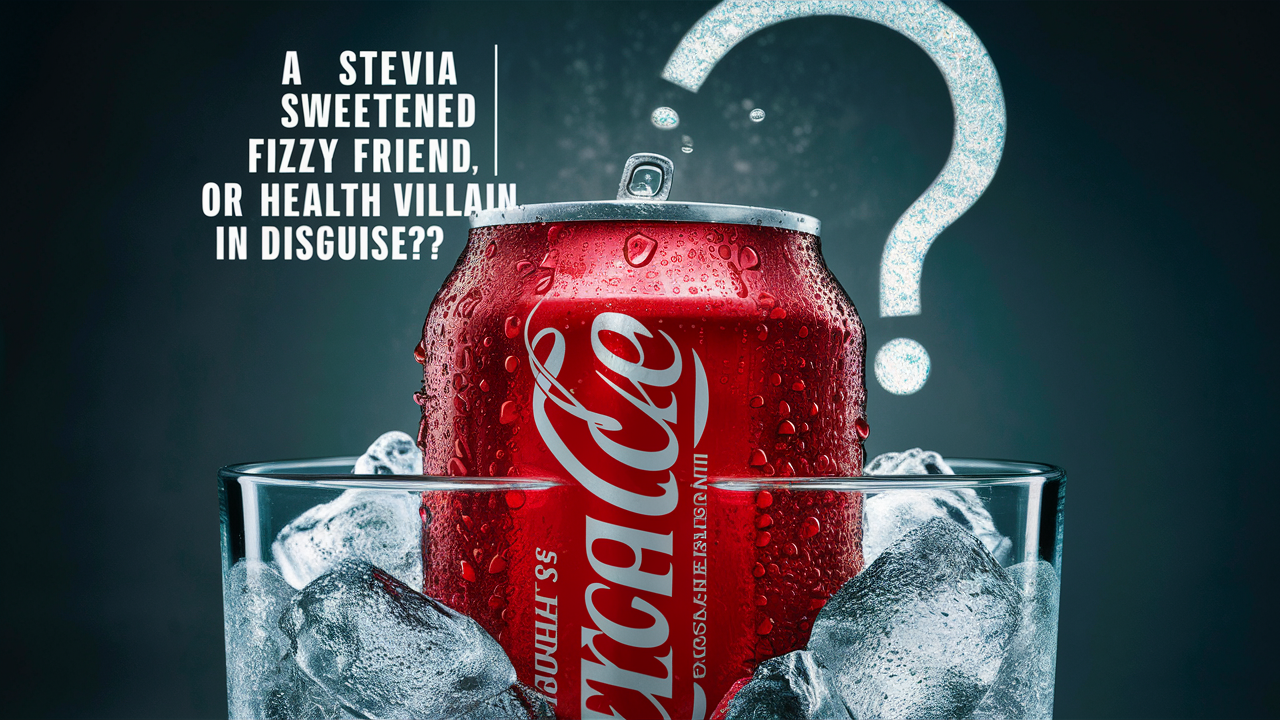
Table of Contents
Diet Coke, a ubiquitous beverage with its iconic red can, has been a staple in refrigerators and lunchboxes for decades. But with the ever-growing focus on healthy living, questions arise about the safety of Sweetened soda in general, and Diet Coke specifically. Is it a guilt-free indulgence, or are there hidden health concerns lurking beneath the fizzy surface? This blog post delves into the science behind Sweetened Coke’s ingredients, explores potential health effects, and empowers you to make informed choices about including it in your diet.
Sweetening the Deal: Artificial Sweeteners in Diet Coke
Diet Coke achieves its sweetness without sugar thanks to artificial sweeteners. The primary sweetener in most Diet Coke formulations globally is aspartame. However, some regional variations may use sucralose or acesulfame potassium (Ace-K). While these sweeteners provide sweetness without adding calories, their safety has been a topic of debate.
Safety of Artificial Sweeteners: Separating Fact from Fiction
Extensive research has been conducted on the safety of artificial sweeteners used in Sweetened Coke. Regulatory bodies like the FDA and EFSA (European Food Safety Authority) have deemed aspartame, sucralose, and Ace-K safe for consumption at acceptable daily intake (ADI) levels. These ADI levels are established with a significant safety buffer to account for individual variations in metabolism.
However, some studies have suggested a potential link between artificial sweeteners and various health concerns, including:
- Weight Gain: Paradoxically, some studies suggest a link between artificial sweetener consumption and weight gain. The theory is that these sweeteners may disrupt gut microbiome balance or alter appetite signals, leading to increased calorie intake.
- Metabolic Syndrome: A cluster of conditions including high blood pressure, high blood sugar, and unhealthy cholesterol levels. Some research suggests a possible link between artificial sweeteners and metabolic syndrome, but more research is needed to confirm this.
- Cancer Risk: Studies investigating a potential link between artificial sweeteners and cancer risk have yielded inconsistent results. Regulatory bodies maintain that current evidence doesn’t support a causal relationship between artificial sweeteners and cancer.
It’s Important to Note:
- Most studies suggesting negative health effects involve high intakes of artificial sweeteners exceeding recommended ADI levels.
- Research on artificial sweeteners is ongoing, and more studies are needed to fully understand their long-term effects.
Beyond Sweeteners: Other Ingredients in Diet Coke
Diet Coke contains other ingredients besides artificial sweeteners, including:
- Carbonated Water: The source of the signature fizz.
- Caramel Color: Provides the characteristic brown color. While safe for consumption, it may contain trace amounts of a compound called 4-methylimidazole (4-MEI), which has been linked to cancer in animal studies. However, the amount of 4-MEI in Sweetened Coke is extremely low and not considered a safety concern by regulatory bodies.
- Phosphoric Acid: Adds a tangy flavor but may contribute to bone health concerns if consumed in excess.
- Citric Acid: Another source of tartness.
- Natural Flavors: These proprietary flavorings are generally considered safe.
Diet Coke and Your Health: Weighing the Evidence
Based on current research, moderate consumption of Diet Coke, within ADI levels for artificial sweeteners, is unlikely to cause significant health problems. However, here are some things to consider:
- Diet Coke is not a health drink. It provides no essential nutrients and may contribute to negative health consequences if consumed excessively.
- Water should be your primary beverage. Water is essential for hydration and offers numerous health benefits.
- Be mindful of overall Sweetened. Diet Coke should not be used to justify unhealthy eating habits. Aim for a balanced Sweetened rich in fruits, vegetables, and whole grains.
- Listen to your body. If you experience digestive issues or other problems after consuming Diet Coke, it might be best to limit or avoid it.
Alternatives to Diet Coke: Exploring Fizzy Options
If you’re looking for alternatives to Diet Coke, here are some options:
- Sparkling Water with a Splash of Fruit Juice: Provides a refreshing fizz with a hint of sweetness and some vitamins from the juice.
- Naturally Flavored Seltzer Water: Many brands offer seltzer waters with natural flavorings without artificial sweeteners.
- Flavored Sparkling Mineral Water: Mineral water provides some essential minerals and comes in various naturally flavored options.
- Homemade Flavored Water: Slice fruits, herbs, or vegetables into water for a refreshing and customizable drink.
The Bottom Line: Informed Choices for a Healthy You
Diet Coke, in moderation, is unlikely to pose a significant health risk. However, it’s important to be mindful of your overall diet and prioritize water and other healthy beverages. Here are some additional tips:
- Read Food Labels: Be aware of the ingredients and artificial sweetener content in Sweetened sodas.
- Consider Stevia-Sweetened Options: Some Diet Coke variations use stevia, a plant-based sweetener generally considered safe. However, stevia can have a slightly different taste profile.
- Focus on Portion Control: Even calorie-free beverages can be consumed in excess. Limit your intake of Diet Coke and prioritize water throughout the day.
Diet Coke and Specific Health Conditions
If you have certain health conditions, it’s crucial to discuss your diet with a healthcare professional. Here are some specific considerations:
- Pregnant or Breastfeeding Women: While generally considered safe in moderation, some healthcare providers may recommend limiting artificial sweetener intake during pregnancy and breastfeeding.
- Individuals with Phenylketonuria (PKU): Aspartame contains phenylalanine, which can be harmful for people with PKU. Look for Diet Coke sweetened with sucralose or Ace-K if you have PKU.
- Diabetics: While Sweetened Coke is sugar-free, it may still affect blood sugar levels in some individuals. Monitor your blood sugar levels and talk to your doctor if you have concerns.
Remember: There’s no single answer to whether Diet Coke is “safe” for everyone. The answer depends on your individual health, overall diet, and consumption patterns.
Empower Yourself with Knowledge:
- Websites:
- Academy of Nutrition and Dietetics: https://www.eatright.org/
- American Beverage Association: https://www.americanbeverage.org/
- FDA – Artificial Sweeteners: https://www.fda.gov/food/food-additives-petitions/aspartame-and-other-sweeteners-food
- Books:
Embrace a Balanced Approach to Beverages
Diet Coke can be a refreshing occasional treat, but it shouldn’t be your primary beverage of choice. Focus on water, sparkling water with natural flavors, or homemade infused water for optimal hydration and health benefits.
Remember, a healthy lifestyle is about making informed choices and enjoying all things in moderation, including the occasional can of Diet Coke. With a focus on water, a balanced diet, and mindful consumption, you can make informed choices about including Diet Coke in your life, if you choose to do so at all.pen_sparktunesharemore_vert
